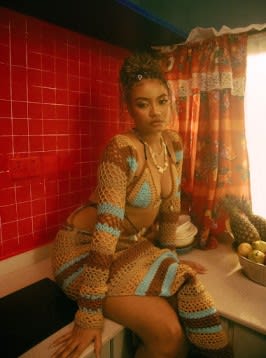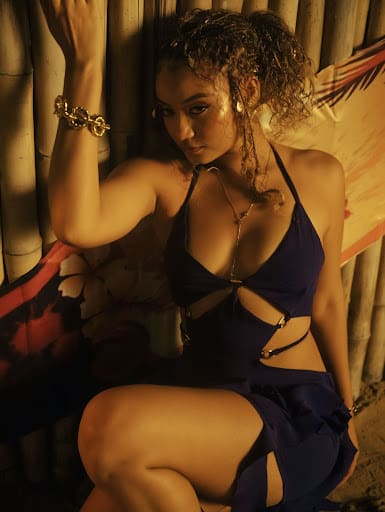Princess Adjua, stage name Mellissa, is a genre-blending artist whose sound incorporates global sounds to create a fusion which she describes as “Afro Sexy”. Her Debut Single, Me & U, fuses Latin and Afrobeats sounds. She has collaborated with Amaarae, Boj, and Ajebutter22.
Mellissa was named Apple Music’s Up Next artist for Ghana after her recent single “Me & U,” dubbed “an anthem for the girls,” and has received championing support from Apple, BBC R1, 1xtra, and various community stations. Eddie Kadi’s Hot Shot track on The Official UK Afrobeats Chart and Afronation’s Spotlight track of the week were also featured on the track. Her debut EP is set to be released in February 2024.

Mellissa, joined the call from London. She sits in a room with a black and white patterned wallpaper during the call.
Can we start with you giving me a little background about who you are and what you do?
Mellissa: I’m Mellissa. I’m from Ghana. My music is kind of inclusive. A mix of different things, obviously Afro beats, is a massive part of my life, but then I listen to various music. So there’s a mix of R&B, Caribbean, reggae and Dancehall Music, and I’ve tapped into these and picked the aspects I need in my music.
You were in the choir while growing up. Would you say it built your vocal skills?
Mellissa: The simple answer is yes. It was a combination of being in the choir and performing at all the talent shows I could. In a way, I was preparing myself for the work I’m doing now. I had to learn how to manage being on stage from a young age, which helped.
You’ve mentioned a few genres. Which of them did you listen to while growing up? What kind of music influenced your desire to become an artist?
Mellissa: I listened to a lot of different Music. My mum had a restaurant, and It was right next to our house. She would play the local music and a lot of different vibes. But then, on the slow nights, she would play R&B music and all the hits at the time. So I listened to many Rihanna, Alicia Keys, and Whitney Houston. Whitney Houston is a massive influence on me. Her aura, her stage presence, and so many things about her journey inspire me.
I, you know, connected with what I’d call a broad palette of music. In school, I used to listen to a lot of Sean Paul. I went to Soul Clinic International in Ghana. We used to have this thing called Jams at the end of the school year, and some of our classmates would be the DJs. So, whatever we were listening to was what we would be Playing. By the end of the year, they would turn our classroom into a party. It was nothing terrible, just us having fun and dancing.
Did you always think you would be an artist? Did you always have that dream?
Mellissa: When I was younger. My mom would play drums and sing, and then that would help me eat. I’ve always known from a young age that I would be an artist. I did take a detour at some point and went to film school. But I made my way back to music after I completed it. At the time, I was sure I thought, “Yes, it’s music for me.” I have a lot to say, and music is how I want it. I still use film to tell these stories. So, I’m glad that I made that part of my journey.
Can you describe your sound for us?
Mellissa: The best way to describe it is to say. Afro-sexy is feeling good. It’s feeling confident and comfortable in yourself during the period I created my EP. I had to make it for myself. I was going through a breakup, and I didn’t want to go through the usual grieving process. I tried to skip that. And channel the version of myself that is unfazed, driven and focused. Mellissa wakes up in the morning and is strutting about doing what she’s supposed to do. That’s the vibe I was on. The day I recorded the first track on the EP was the first day I experienced a strike in London. There was no means of transportation, and I was 3 hours late to the studio. I told myself I would not stress myself. And I would have a good time. And it came through in the song.
For me, and I think some people might think this. Afro-sexy is sensual and flirty while being comfortable in your body. Do you agree with this?
Mellissa: I think it’s a part of it. It’s about feeling comfortable in your body, being free, and expressing that freedom. I wouldn’t say that’s the core of it. But it’s a part of it.
What was your writing process like for the EP?
Mellissa: I had to remove certain blockades in my mind that came with the breakup I mentioned earlier, and I had pushed the song out. And once it arrived, all the other pieces rushed out as well. I felt I was creating magic. I felt free at the time.
What stories did you want to tell with the EP?
Mellissa: I wanted to talk about freedom. I tried to communicate the good parts of the relationships I had been in. I wasn’t bitter about the breakup. I didn’t want to be sad or talk about depressing things. I tried to project goodness. It came through in Me n U, as you said; it was flirty and girly. I created what felt like a big scoop of ice cream every time I listened to it. I always like to make music I can listen to.
I don’t want to get bored of It. I want to be able to consume it. That’s the only music I want to make for people because that’s what they deserve. It was effortless to create the music.

Your sister is also a musician. Can we talk about her influence on you and your relationship with her?
Mellissa: That’s my best friend. We’ve been making music together since we were little on our way to school. We’d be hitting the car seats, singing and freestyling. We’d probably have a project together. Possibly like a reverse of Destiny’s child, we would establish ourselves and then partner up and start a band—like Silk Sonic.
Henny Talk was a bit bolder than the older songs on the EP. You were more vulnerable. Was the process of writing it different from the other tunes?
Mellissa: The song incorporated the complex and vulnerable parts of a breakup. You know that friend that says they’re never going to talk to their ex again, and they do. That’s what the song is about: the denial and the emotions that come with heartbreak. It was a bit difficult to express these emotions while writing the music. I had to make sure it captured those emotions. So, I guess it was different.
While I listened to the song, I noticed all of these emotions, which still had a catchy tune. So it was like what we have with Omah Lay and what people call Afro-depression: catchy songs with heavy emotional lyrics.
Mellissa: Yes, it makes the message pass easier. I don’t know about others, but for me. I wouldn’t say I like listening to sad music. I want to create a balance between the music and the lyrics. Although Henny Talk is kind of a heartbreak song, the uptempo drums and percussions used in the production make it fun.
You mentioned that you had a breakup before recording the EP. Was there a correlation between the breakup and the songs in it?
Mellissa: There was a correlation. I felt I needed to get out of those feelings and embrace freedom.
How did you come into production?
Mellissa: Film school helped me to get into it. I have a story for that. We were meant to create sounds for classic cartoons. I was supposed to make the sounds for WALL E Robot. We had to use drill sounds and different sounds to recreate the sound for the cartoon. Anyone who scored high on the project wouldn’t have to take the final exam, and I got a high score. So I didn’t have to take the exam. That was my first experience doing sound design. In 2020, I started practising it more. I created some of the songs for the EP, then.
There’s a gap in female producers. Would you like to work on producing music in the future, and would you be open to working on songs with other artists?
I would love to do that. I am especially collaborating as a producer. I want to work with Tems. I want to work with Bloody Civilian as well; she’s fantastic. I wouldn’t shift to being a producer. I’d still be writing music and recording music.
You recently performed with Boj. How was that experience?
Mellissa: It was amazing. I got to meet other artists. After I performed, I met Wizkid, and he complimented my performance.
Would you like to work with other artists?
Mellissa: Yes, definitely. The list is long. Just Afrobeats artists or in general? I like Burna Boy, he made me feel comfortable with my lower register. There’s also Rosalia, Tay Iwar and Rihanna.
Do you have any plans for the future? Is an album in sight after the EP?
Mellissa: There’s no specific date yet. There is more music being made.





